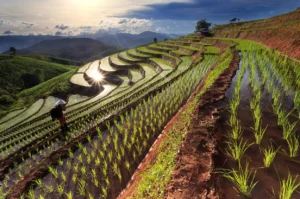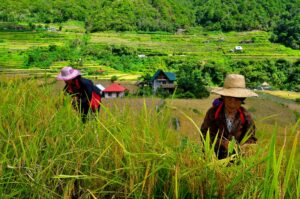This edition of Women of scientific substance features Madonna Casimero, a senior scientist at the International Rice Research Institute (IRRI). Dr. Casimero is an agronomist by training and her research activities focus on improving the productivity of smallholder rice-based farmers in the Southeast Asian region through participatory adaptive research. Her other development activities include building and improving the capabilities of national agricultural research and extension system partners in conducting effective research-for-development (R4D) and developing, implementing, and facilitating the training of farmers.

Why did you decide to become a rice scientist?
I grew up in a rice farming community and my parents are farmers. I personally witnessed and experienced the challenges faced by farmers in the field. I wanted to be able to provide solutions to the agronomic constraints limiting yields and productivity of the farmers.
Thus, I studied at the University of the Philippines Los Banos to pursue a degree in agriculture. I continued to take my graduate degrees (MS in Agronomy and Ph.D. in Agronomy) to further advance my knowledge and skills.
Rice science is a catalyst in transforming the lives of smallholder rice-based farmers. There are many questions that need to be answered in the field. For example, why do smallholder farmers still have low yields?
Do we really have a good understanding of the constraints that they encounter in the field and how they decide on the technology options that they want to adapt/adopt considering the different challenges such as limited natural resources and financial resources, not-so-well functioning extension system, infrastructure support, and competition due to trade liberalization, among many other issues?
As an agronomist, what can I do to resolve some of the issues that limit farmer productivity? What can I do to bring effective innovations to farmers? These were the two main drivers why I pursued a career in rice science while I was at the Philippine Rice Research Institute (PhilRice), and now at IRRI.
What are you working on at the moment?
I am currently working on developing and adapting best management practices (BMP) for rainfed lowland rice in the Philippines and developing and adapting Good Agricultural Practices (GAP) for rice in Laos.
Both projects entail adaptive research, demonstrating the BMP/GAP in farming communities and building the capability of the extension staff to bring these for rice production and rice seed production to farmers.
I am also leading the capability-development activities of the Agriculture Development Support Project in Myanmar to train the national and regional trainers on BMPs/GAPs in rice and climate-smart agriculture.
I am also leading projects to improve the R4D capabilities of national agriculture and extension system partners in the Philippines
How do you think your work will make a difference in the lives of farmers?
I am a farmer’s daughter and I am a farmer myself. Pursuing a career in science to develop new innovations and bring solutions to the constraints besetting farmers will improve the way they manage their farms and provide new opportunities to better their livelihoods.
In my 30 years as an agronomist, I have seen many farmers improve their farming practices, diversify their farms, and gain new skills to go beyond rice production and level up to become entrepreneurs.
I have personally seen the transformation of livelihoods of men and women farmers (for example in Indonesia and Myanmar) through our research and development initiatives in the country.
.
At PhilRice I worked with colleagues to develop and adapt Palayamanan (palay = rice; wealth = kayamanan) to bring a new twist to a diversified rice-based farming system. PhilRice still continues Palayamanan and the Philippines Department of Agriculture has adopted it as the platform to promote diversified rice-based farming systems to improve household-level food security, income, and livelihoods, and enhance the resilience of farmers to climate change.
What was the biggest lesson you learned from your unsuccessful endeavors?
Donors have different ways to assess our performance as an R&D partner. We can perform well in the technical conduct of R&D but we also need to be more agile and adaptive in the other aspects of project management (administrative and financial management) so we do not lose our opportunities for funding and partnerships with those donors.
What are the hardest challenges related to your work?
Building partnerships and gaining the trust of the partners when I am new in a country; learning the language so I can communicate more effectively with farmers and national partners; learning the local and national culture, and understanding the agricultural context in the country so we can formulate the right approaches and strategies help them through our work in research and development.
Did you have a role model that influenced your decision to work in science?
No one in particular but I admire scientists who are experts in their fields but also have a good understanding of the challenges of farmers and are truly passionate to work with farming communities. I admire scientists who are not afraid to get their feet dirty and muddy.
In your career, have you been specifically mentored or supported by someone? How important was that for you?
During the early part of my career as a researcher, I was lucky to gain the support of former executive directors at PhilRice to pursue my graduate degrees, lead research programs, and be part of the PhilRice management.
At IRRI, I was also supported by my supervisors and the management to lead projects in Indonesia and Myanmar and be IRRI’s representative in Myanmar in 2013-2015. These were defining moments for me, in my career as a scientist and assume a management role as a country lead of IRRI.
It helped me gain confidence not only in my work as a scientist but also as a leader and manager of a country office
Did you ever doubt your abilities as a scientist in a field dominated by men? How did you handle it?
I doubted my ability to lead an IRRI Country Office as no woman scientist had been assigned to that position before. However, I considered that as a challenge and an opportunity to prove that a woman scientist can be an effective country representative as well.
I took stock of my past experience as the former deputy director for research and development at PhilRice and used what I learned during my stint as a project scientist in Indonesia to develop a strategy to work more effectively with national partners and the various development partners in Myanmar.
Did you ever have the impression that your career path would have been easier if you were male?
Not at all. Being a Filipina, I did not experience any bias because I am a female.
What were the biggest obstacles you had to overcome?
The biggest obstacle that I had to overcome while in Myanmar as a scientist and country lead was how to train and improve the R&D skills of the national staff and how to implement the research well in remote project sites and achieve the objectives of the projects.
As a trusted R&D partner, we had to show that we can implement the research projects effectively regardless of the resources that we had and the situation we were in. The project sites were challenging then. They were far and highly risky as there were no roads. We had to travel by boat to go to the project sites in the Ayeyarwaddy Delta and Rakhine State.
In your opinion, what are the things that could attract more women to go into science?
Science is precise and systematic; it requires patience and love for details in addition to in-depth knowledge of your field. Women have those characteristics and the challenge to produce something innovative and useful that would benefit society will continue to lure them to dive into science as a career.
Ultimately, when you look back at your entire career, what do you hope to have accomplished in terms of your work?
I have performed several roles in my career as a scientist at IRRI. I have worked in the field and saw how we can help transform the lives of farmers through our research products (varieties and other new innovations) and build the capabilities of partners and farmers. I have led research project teams and the Myanmar Country office for three years.
All these years, I have contributed, as an agronomist, in one way or the other, to the collective effort of IRRI to touch the lives of many rice farmers in the world. To me, that is a significant accomplishment as a woman scientist.






